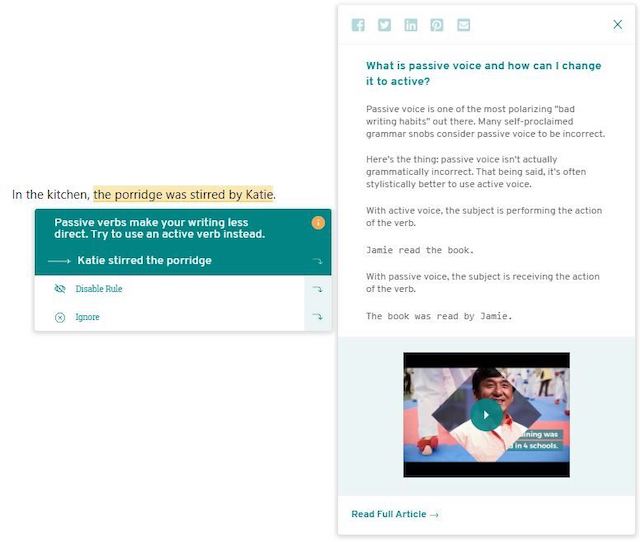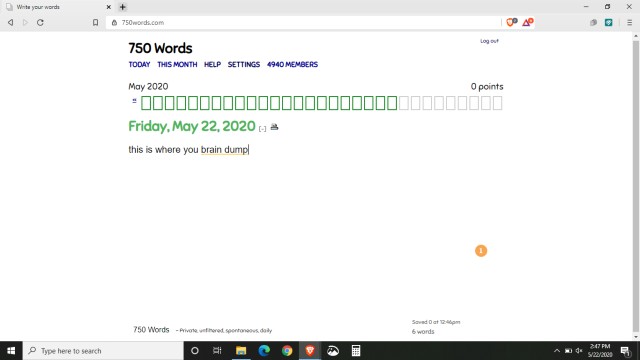
It’s easy to become overwhelmed with all the writing resources on the internet. And when writers become overwhelmed, we often fall down the rabbit hole for hours. It’s in our nature to want to read everything we can about our craft! But then we’re left with nothing but blank pages.
Which websites can actually help you write that book you’ve always dreamed about?
ProWritingAid, of course, tops the list. Our editing tool is so much more than a proofreader. It analyses your writing in realtime, giving you reports on 25 key areas like readability, thesaurus check and sticky sentences. If you're editing in a hurry, the summary report will show you where you can make the most improvement in the shortest amount of time. It's definately an important part of my writing process. Our blog is also full of expert articles on every aspect of writing.

We (obviously) love ProWritingAid and think you will too. But what else is out there? I’ve rounded up ten of the best sites, so you don’t have to go searching for what you need. Let's dive into what else the internet has to offer.
Productivity Tools
Do you struggle to actually get words on the page? You aren’t alone. Here are some of the best options for getting you to write.
750 Words
The Artist’s Way by Julia Cameron was published in 1992, and many writers swear by it. The most popular piece of advice is something called “morning pages.” As writers and artists, we often struggle to focus because our brains are running ninety miles an hour. With morning pages, the very first thing you do every day is write three pages, by hand, of anything and everything on your mind. It’s a brain dump. You don’t lift your pen.
I did this for a while, and I loved it. But it’s 2020, and I have chronic pain, so writing longhand for a half hour was tedious. Apparently, I wasn’t the only person who preferred a digital option. At 750 Words, you can sign up to have a brain dump, private journal. The number is based off the widely accepted figure that one page equals about 250 words.
You rack up points for writing every day. You can also log things like your mood while you write and keep track of your writing times.

Bestseller Experiment
Mark Desvaux and Mark Stay are the co-hosts of the successful writing podcast, The Bestseller Experiment. They have interviewed many bestselling authors, and they kept getting the same advice. To write a bestseller, you must write every day.
They’ve turned this into an online challenge. You can sign up for motivation to write. But here’s the best part: you don’t have to write a few thousand words every day or spend hours at the computer. If you only wrote 200 words a day, you’d have a 73,000 word novel by the end of the year.
200 words? That’s basically a paragraph or two! Sign up to join other authors in the quest to write every day and publish a bestseller.
4thewords
Many of us grew up playing video games, and some of us still do! Writing every day can get tedious. We start getting distracted or putting it off to d
The creators of 4thewords realized this, and they decided to make writing every day more fun. The website is a fantasy-style video game. You can slay monsters and get rewards. You can go on quests and discover the world.
But you have to write to do it! You must write a certain amount of words in an allotted time to defeat monsters and complete quests. You get better rewards based on your writing streak. Plus, it’s cloud-based and can store your novel while you write it.
Plotting Tools
Plotting can be hard. Everyone has a different method they think is the “right” way. How do you sift through and figure out which plotting method works for you?
Wavemaker
There are a lot of great novel-writing programs out there, even free ones. But Wavemaker stands apart with its plotting tools. This program is 100% free. You can do all of your planning and writing here, or just use it for the plotting tools. It also backs up your novel to Google Drive, so you don’t have to worry about losing any of your work.
Are you a timeline person or a mind map person? You can be both at Wavemaker. You can make a storyboard with their plot cards or make a plot grid similar to a J.K. Rowling’s famous plotting method. There is also the Snowflake Tool, which allows you to use the popular Snowflake plotting method.
Wavemaker also comes with a challenge tool. You set a time limit and word count goal--and you can’t go back and edit. It only saves your work if you reach the goal, so it’s a great way to kick your writing into gear.
One Stop For Writers
“One Stop For Writers” is a pretty big claim, but as a recent convert to this site, I have to agree. This site was created by Angela Ackerman and Becca Puglisi, the authors of The Emotion Thesaurus and other writing thesauruses.
It’s $9 a month, but as a thrifty person, I have to say it’s totally worth it. You get access to every thesaurus these two have written. That includes the big ones like The Emotion Thesaurus and The Negative Trait Thesaurus. But you also get the ones exclusive to this site, like The Character Motivation Thesaurus, The Color and Pattern Thesaurus, and The Symbolism and Motif Thesaurus. There are FIFTEEN of these books on the site, and it’s searchable.
That alone is worth the price, but One Stop For Writers also has a bunch of great plotting tools. There is an easy-to-use timeline, story and scene maps, and worldbuilding surveys. The character builder helps you build detailed characters. And that’s just a few of the tools. This is my new favorite “must-have” resource.
Trello For Writers
Trello is a project management tool, and it could easily fall into the productivity category. But the best thing about this simple, free organization tool is that it is so versatile. I have my whole life organized on it.
Writers have figured out how useful Trello is for novel-writing. You can create a board for each story or even each character. You can create lists for plot points, characters, and settings. Plot act-by-act or use other plot structures. The link above goes to several pre-made templates that you can adapt into your own.
Trello allows you to save links, notes, and images in one place. Imagine taking your plot notebook, your inspiration corkboards, your database, and your storyboard and merging it into one tool. That’s basically what Trello can do.

Tools To Use While Writing
Have you ever been in the writing zone, your fingers flying over the keyboard, and then you get stuck on one tiny word? We’ve all spent time looking for that one perfect word that we just can’t remember. Or we need to name a brand-new character, so we start searching baby name sites for hours. These two tools are ones that save me so much time when I’m writing.
Reverse Dictionary
The other day, I could not remember a word, and I had to have it. I looked up close synonyms in a regular thesaurus, but I couldn’t find it. All I knew was it roughly meant “make someone like you.” I typed that into Reverse Dictionary, and there it was: ingratiate.
Reverse Dictionary is so much more than a thesaurus. You can search phrases like that and find the right word or phrase. It gave me other options, like, “curry favor” or “score points with.” You just don’t get those sorts of idioms with a regular thesaurus.
Name Generator
There are many name generators out there, but I have repeatedly found this one to be the best. You can use it for character names, brand names, place names, and more. Do you have a rapper or famous band in your novel? There’s a generator for that, too.
I love the character name generators because it lets you set search parameters like age and nationality. It even includes some types of fantasy names! You can also have it generate names that have alliteration or start and end with certain letters.
Tools to Use for Self-Publishing
Kobo Writing Life
One of our favorite publishing platforms out there is the Kobo Writing Life community. Unlike some other self-publishing systems (KDP, I'm looking at you!), KWL makes the self-publishing process easy. You can set your own prices, run your own promotions, and reach a huge global audience in over 190 countries.
All About Writing Craft
There are so many wonderful blogs and sites about the craft of writing. I’m sure everyone has their favorites. I’ve picked two sites that I go to when I need good answers fast because I know these blogs are reliable.
Fiction University
Fiction University is Janice Hardy’s blog, and it is chock full of amazing writing information. Janice Hardy is a bestselling author of craft books, and her blog is regularly featured on various “best writing resource” lists.
The site is easily searchable by topic, from plotting to querying. She addresses common writing problems like infodumps and lack of motivation. There are posts on everything from worldbuilding to writer productivity.
The Creative Penn
Another award-winning blog belongs to Joanna Penn. The Creative Penn has resources on just about every topic out there. She’s also written books and hosts a writing podcast.
The blog isn’t as easy to navigate as Fiction University, which has topics listed on the side. But there is a search feature to find what you are looking for. There are also online courses if you need more guidance, on topics ranging from writing a novel to marketing it.
Final Thoughts
I hope this list helps you become more organized, more productive, and more confident in your writing abilities. However, this is by no means an exhaustive list. There are so many wonderful writing resources out there.
What are you favorite websites for writing?

